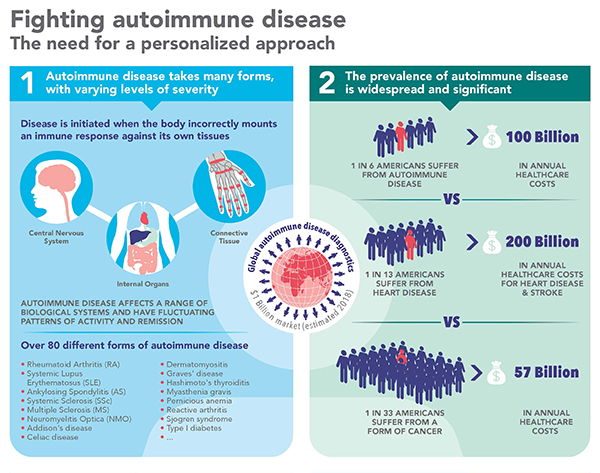Autoimmune Disorders: Immune System Functions Gone Wrong
An autoimmune disorder is a condition in which the immune system mistakenly attacks and destroys the body’s own healthy cells and tissues.
There are over 80 known types of autoimmune disorders, which have a wide range of effects on the body. For example, while some autoimmune disorders affect the nervous, endocrine or gastrointestinal systems, others may affect the blood, connective tissues or the skin.
With the many different types of disorders and the variety of symptoms they produce, autoimmune diseases can often be very difficult to diagnose.
Women and Autoimmune Disorders
Nearly 75 percent of all autoimmune disorder patients are female. The reason for higher incidence rates in women is unknown. African-American, Native-American and Hispanic-American women seem particularly susceptible.
If studied individually, most autoimmune diseases, such as lupus or celiac disease, may seem fairly uncommon. However, if autoimmune disorders are examined as a whole, they constitute the fourth-largest cause of physical disability among American women.
Healthy Immune System Functions
The immune system is composed of a vast network of cells and molecules that work to defend the body and eliminate infections.
Over the course of a lifetime, the immune system builds an extensive catalogue of microorganisms and other “foreign” substances that enter the body. Harmful substances that the immune system regards as threats to the system are called antigens. Examples of antigens include:
- Bacteria
- Cancer
- Foreign blood or tissue (from another person or animal)
- Toxins
- Viruses.
The function of a healthy immune system is to protect the body against these antigens by producing specialized white blood cells or by releasing antibodies (proteins produced by lymphoid tissue). Antibodies help attack foreign substances and remove them from the system.
Causes of Autoimmune Disorders
In autoimmune disorders, the immune system mistakenly attacks the body’s own healthy tissues instead of the invading antigens.
Why the immune system loses its ability to distinguish between healthy tissues and antigens is largely unknown. Autoimmune disorders are currently one of the most poorly understood diseases. Current research is slowly revealing particular genetic, hormonal and environmental risk factors that may contribute to the onset of these diseases. However, there is still a long way to go toward better understanding, diagnosing and treating autoimmune disorders.
Types of Autoimmune Disorders
The two general types of autoimmune disorders include:
localized autoimmune diseases, those that affect only a single organ or tissue
systemic autoimmune diseases, those that damage many organs.
Keep in mind that autoimmune disorders that only affect one organ can still have far-reaching effects for the rest of the body due to the complex interrelationships between our different organ systems.
Systemic Autoimmune Diseases
Some of the most prevalent systemic autoimmune disorders are included in the table below, along with the areas of the body they most commonly affect:
- Guillain-Barre syndrome: nervous system
- Goodpasture’s syndrome: lungs and kidneys
- Lupus (also known as Systemic Lupus Erythematosus, or SLE): joints, skin, brain, kidneys, red blood cells, heart and other systems
- Polymyalgia rheumatica (PMR): large muscle groups
- Rheumatoid arthritis (RA): joints
- Sjogren’s syndrome: salivary and tear glands and the joints
Localized Autoimmune Diseases
Included below is a list of common autoimmune diseases that directly target only one area of the body.
- Addison’s disease
- Graves’ disease
- Hashimoto’s disease
- Type 1 Diabetes
Symptoms of Autoimmune Disorders
Although symptoms vary greatly depending on the type and nature of the autoimmune disorder present, common non-specific symptoms for many autoimmune diseases include:
- Dizziness
- Fatigue
- Low-grade fever
- Malaise (a general feeling of not being well)
Diagnosis of Autoimmune Diseases
Doctors can use several methods to diagnose autoimmune diseases and determine their location and the extent of the damage done. Current testing methods include:
- Antibody testing
- Blood tests
- Cerebrospinal fluid analysis
- Electromylogram
- Magnetic resonance imaging (MRI) of the brain.
Treatment of Autoimmune Diseases
Treatment for autoimmune disorders varies widely, depending on the type of disease. Most treatment methods focus on alleviating symptoms rather than addressing the cause of the disease. Some of the most common methods of treatment include:
- Blood transfusions for patients suffering from disorders that affect the blood
- Hormone therapy
- Immunosuppressant drugs (drugs that work to manage or limit the immune system in order to prevent it from further attack on healthy organ systems or tissue)
- Insulin injections for patients suffering from diabetes
- Supplements to help replenish important hormones or vitamins depleted by the disease.
There are currently no preventative treatments for autoimmune disorders.
Resources
American Autoimmune Related Diseases Association (AARDA)(2008). Autoimmune Disease in Women. Retrieved April 17, 2008, from the AARDA Web site: http://www.aarda.org/women_and_autoimmunity.php.
Medline Plus (2008). Autoimmune Diseases. Retrieved April 17, 2008, from the Medline Plus Web site:
http://www.nlm.nih.gov/medlineplus/autoimmunediseases.html.
Lee, Steve, DO (2007). Autoimmune Diseases. Retrieved April 17, 2008, from the Drugs.com Web site: http://www.drugs.com/enc/autoimmune-disorders.html.

